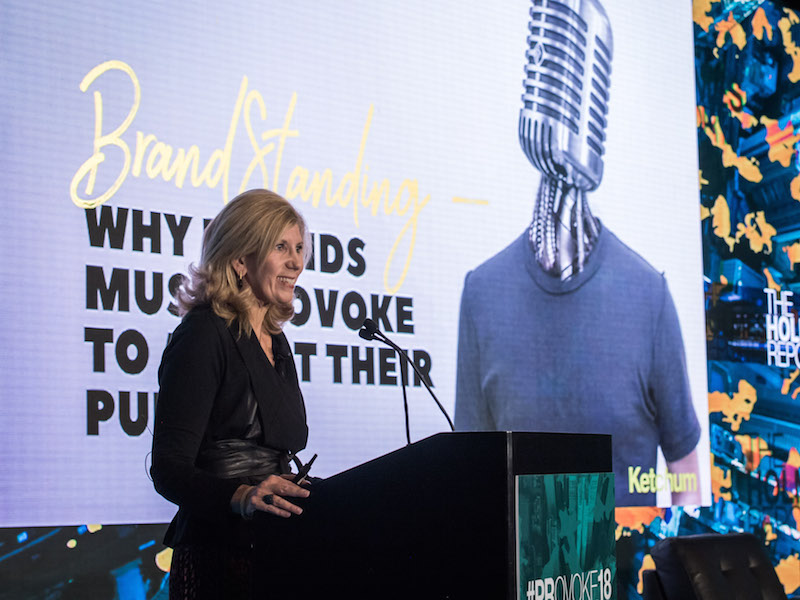Maja Pawinska Sims 24 Oct 2018 // 1:00AM GMT

WASHINGTON, DC — Ketchum CEO Barri Rafferty has encouraged agencies to be braver and bolder in selling more daring creative to clients, to help them reach the “sweet spot” of being provocative as well as purposeful.
“How often in a pitch would you say less than 50% of clients buy that idea?” she asked delegates at the PRovoke Global Summit, “A lot of the time that’s the provocative work – I would encourage everyone to be a little bit more provocative to take brands to the next level, and not only be a force for good, but a force for change.”
Speaking at a session on “BrandStanding — Why Brands Must Provoke to Assert their Purpose,” Rafferty said: “In today’s divisive world, standing for something is no longer enough, you must stand out for what you believe in. To have real world impact, brands are pushing the boundaries, challenging the status quo and courting controversy to make a stand, to spark conversation and action, and ultimately to see a change in the world.”
Rafferty outlined a number of examples of brands who are taking a stand, from outdoor clothing brand Patagonia endorsing senate candidates in Montana and Nevada – thought to be the first time a corporation has explicitly endorsed a candidate for public office in the US – to ScotiaBank addressing Peru’s gender pay gap – the highest in Latin America – by giving women a 29.2% discount. She also cited the multi-award-winning #bloodnormal campaign for Libresse, and Nike’s Colin Kaepernick ad.
Also on the panel was Lisa Gibby, VP corporate communications at Nestlé, who said some of the company’s brands were more provocative than others: “Some play it closer to the line than others – you just need to do what’s authentic to the brand. We’re a Swiss company, we take neutrality pretty seriously and want to do things in a respectful way, but we will take a stand on issues like progressive policies around climate change and paid parental leave. We are provocative when there are issues that are core to who we really are.”
Gibby said the most important factor in deciding how provocative to be in accentuating brand purpose was consistency: “If you are consistently a provocative brand, and that’s your long-term vision, that’s what your consumers come to expect.”
Fellow panellist Marco Morante, founder and creative director of fashion brand Marco Marco, whose recent fashion show broke the industry mould by only using transgender models, sounded a warning note about how provocative brands should be.
“It’s a show I always wanted to do. I’m part of the LGBT community, and this is my market, this is who I sell to. I‘ve always used transgender people, but there was a backlash after this show because, without realising it, I was appropriating a culture that wasn’t my own. It was a learning experience. I don’t feel I was being provocative, I was just speaking to my own experience.
“For me, the most important thing was to acknowledge it and be vocal about mistakes made, and own it as quickly as possible. Ultimately, we’re all trying to stand up for something, because no-one cares about you if they don’t know where you’re coming from. But if you don’t do it correctly, try again.”


































.jpg)

















